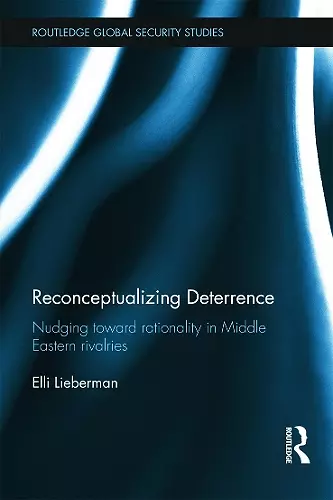Reconceptualizing Deterrence
Nudging Toward Rationality in Middle Eastern Rivalries
Format:Hardback
Publisher:Taylor & Francis Ltd
Published:6th Aug '12
Currently unavailable, and unfortunately no date known when it will be back
This hardback is available in another edition too:
- Paperback£43.99(9781138200654)

This book offers a reconceptualisation of conventional deterrence theory, and applies it to enduring rivalries in the Middle East.
The work argues that many of the problems encountered in the development of deterrence theory lay in the fact that it was developed during the Cold War, when the immediate problem it had to address was how to prevent catastrophic nuclear wars. The logic of nuclear deterrence compelled a preoccupation with the problem of stability over credibility; however, because the logic of conventional deterrence is different, the solution of the tension between credibility and stability is achieved by deference to credibility, due to the requirements of reputation and costly signaling.
This book aims to narrow the gap between theory and evidence. It explores how a reconceptualization of the theory as a process that culminates in the internalization of deterrence within enduring rivalries is better suited to account for its final success: a finding that has eluded deterrence theorists for long.
This interdisciplinary book will be of much interest to students of deterrence theory, strategic studies, international security, Middle Eastern studies and IR in general.
"Lieberman challenges traditional deterrence theory, arguing that the concepts developed to explain Cold War rivalries are not suitable for non-nuclear (conventional) deterrence. He uses as case studies the Egyptian-Israeli rivalry up to 1973 and the tension between Israel and Hezbollah." - Survival
"Looking at deterrence theory and history through the lens of “a learning process,” as is so well detailed in this book, will enable the strategic thinker to see beyond solitary military crises and find the reasons behind periods of stability. Reconceptualizing Deterrence adds greatly to our understanding not only of the Middle East, but of deterrence in general, and the painstaking process it takes to maintain it." - Matthew R. Costlow
"This thoughtful study, which centers primarily on the Israel–Egypt relationship, offers a convincing response to the literature on conventional deterrence...this well-written, nicely organized, and judiciously argued book brings insights to an important subject. Its lasting relevance is clear in the short penultimate chapter that explores the deterrence relationship that appears to have emerged between Israel and Hezbollah after their 2006 confrontation in Lebanon."-- PSQ
"The book is a major contribution to the literature on conventional deterrence… . It is a significant contribution to the field of Security Studies. Its value lies in its revitalization of conventional discourse of Security Studies wherein the State is the key referent object. It also reestablishes the logic of political realism by locating the security problematique in the context of the State, dilemmas of its survival and the interface between political strategy and military capability for the protection of its cartographic identity.' --E-IR
ISBN: 9780415682138
Dimensions: unknown
Weight: 770g
328 pages